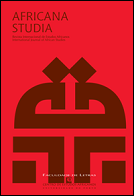The traditional authorities cross the colonial border: Opposing views on the role of religious leaders Jola Huluf and Ajamaat of Lower Casamance (1886-1909).
Resumo
The aim of this communication is to explain the situation of the joola húluf and the joola ajamaat (or felupos) in the border between French Senegal and Portuguese Guinea after the Convention of 1886 between France and Portugal, doing special emphasis in the paper of the traditional authorities joola of the kingdom of the Bubajum áai (with capital in Oussouye) and its relation with the French colonial authorities. Through the information provided by the colonial archives, specially, as well as those obtained on the land and with the existing
bibliography, we will try to describe that the border - in its western end, from the quarry stone of Niambalang to the Atlantic- only existed on the paper, and neither the French colonial authorities nor the Portuguese did not have any control on it. We will also explain as, in addition to the population in general, the traditional authorities not only continued maintaining their bonds in all the joola territory to both sides of the border, but also that took advantage of that border to flee from the colonial power. In this sense we will explain the case of Jamulon
(or Diamoullon) priest of the great altar of traditional religion of the locality of Oussouye called Jaañaañande (in territory under French administration), that, fleeing from the French, took refuge in a town under the trusteeship of the Portuguese administration. While French and Portuguese still took several years in specifying with exactitude the border line, both the traditional authorities and the general population continued working with their own territorial organisation, kinship, social, political, religious and economic terms. In addition, we will show
how while the French vision on the traditional authorities was based on a western idea - the main heads of a society are also their military leaders -, the reality, according to the joola, was very different: the heads joola - kings and traditional priests of religion awaseena- cannot take part in wars or confrontations in which blood is spilled. They were two visions on a same reality that produced deep consequences on the joola societies.
Downloads
Downloads
Publicado
Como Citar
Edição
Secção
Licença
Os autores cedem à Revista Africana Studia o direito exclusivo de publicação dos seus textos, sob qualquer meio, incluindo a sua reprodução e venda em suporte papel ou digital, bem como a sua disponibilização em regime de livre acesso em bases de dados.
As imagens, no caso de serem originais e enviadas por via postal, serão devolvidas se assim for explicitado pelos autores.
A Africana Studia é uma revista de acesso aberto que visa promover a divulgação e o debate da investigação científica. Todos os artigos aceitos são, portanto, publicados gratuitamente para autores e editores.




